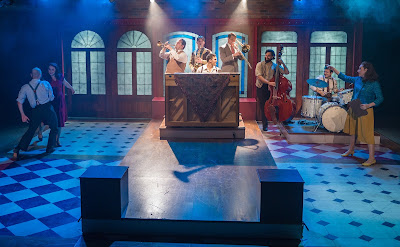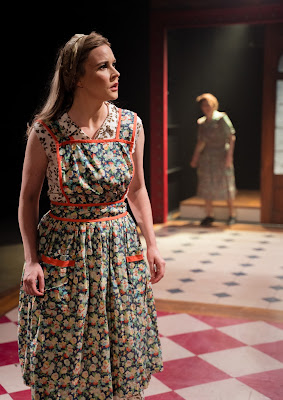By James V. Ruocco
A serious musical about the damage war does to its surviving soldiers and veterans, "Bandstand" - the thrilling, hypnotic summer presentation at Playhouse on Park - unspools with an understandable darkness and pain so vivid and so alluring, it thrusts you into the center of the action and keeps there you - riveted, excited and anxious - haunted by the narrative, the characters, the music, the vintage dances and the forgotten traumas of a survivor's guilt, depression, lingering sadness and the bad, traumatic after effects of the war itself.
Intercut with artillery fire, remembrance and powerful, immersive storytelling techniques, "Bandstand" is a profound, catchy and raw theatrical piece, offset by a daring, matchless immediacy and alertness that grabs you by the throat and never once releases its grip.
It excites and stirs.
It shocks and frightens.
It numbs the senses.
Its sustained arc of intensity is nurtured with swept away thrill and fascination.
It echoes with duty-bound privilege.
It is well crafted, exceptionally directed and powerfully performed.
Set in 1945, "Bandstand" tells the story of Donny Novitski, a handsome musician and soldier who returns home from the war tormented by visions and memories of his best friend Michael, whose death on the battlefield was actually caused by Donny himself, a fact that he keeps from Julia, Michael's widow - at first, anyway.
This being a musical, book writers Robert Taylor and Richard Oberacker (they also wrote the music and lyrics) have devised a quick-and-easy, level-headed plot that finds Donny and his fellow army veterans forming a big band (Julia eventually is introduced as the lead singer) destined for greatness if they become the first prize winners of an upcoming national 1940s swing band contest. In between, the horrors of war and its effect on pretty much everyone in the band, toughen up the story, its exploding realism, its bite, its restorative power, its hurt and its frank, often misty-eyed vocabulary.
Staging "Bandstand" at Playhouse on Park, director Sean Harris carries out the play's musical story with golden age spirit and rootedness, PSTD believability, communicative thrust and balance, observed honor and compliance and fused, immersive seriousness. At the same time, he celebrates the joys and charm of big-band swing, the blossoming romance between Donny and Julia, the band's final audition in New York City and the conflicts that arise once everyone realizes that the contest itself is more exploitative than legit.
Directorially, Harris's reenactment of "Bandstand" is swaggering and sharp, richly theatrical, anchored and steady and juiced up with ideas, traditions and movements that portray a very different lifestyle that existed 78 years ago. To his credit, there is no modernization, updates, lingo or contemporary isms in his interpretation. He also plays the action to the fullest in an immersive, three-quarter staging using James Rotondo's atmospheric turntable set to the max suggesting and implementing multiple locations that keep the storytelling fast, fluid, cemented and lucid.
Musically, the "Bandstand" score, created by Robert Taylor and Richard Oberacker fuels the two-act production with a 1940s zing and snap, a breezy wallop, a liberating concentration and a novelty like appeal and dizzying momentum. All of the musical numbers fit seamlessly into the framework of the story and smartly fulfill their intended purpose.
In order of introduction, they are: "Just Like It Was Before," "Donny Novitski," "I Know a Guy," "Ain't We Proud," "Proud Riff," "Who I Was," "Counterpoint/Pie Jesu," "Just Like It Was Before (reprise)," "First Steps First," "Breathe," "You Deserve It," "Dwight Anson & Jean Ann," "Love Will Come and Find Me Again," "Right This Way," "Nobody," "The Boys Are Back," "I Got a Theory," "Everything Happens," "Welcome Home," "A Band in New York City," "This is Life," "This is Life (reprise)," His Theory," "Welcome Home (Finale)" and "Epilogue."
As musical director, Melanie Guerin brings a tremendous sense of vintage appeal and big band swell to the proceedings, capturing the signature sound of the period, its orchestral vibrancy, its jazz swing rhythms and references, its swaying and snapping and its shouldering knock, sweep, nudge and elbow. The production also benefits from the on-stage presence of cast members who not only sing, dance and act but play their own musical instruments. It's a conceit that creates an immersive supper club atmosphere of high standards and one that lifts the spirits, drives the message home and heightens the play's ongoing musical drama.
"Bandstand's" heart, soul and drive wouldn't be complete without the booming, boogie-woogie, nostalgic shimmer of Darlene Zoller and Robert Mintz's choreography, which, as recreated here, unfolds with a period vibrancy, glisten and gleam that is snazzy, individual, fronted and engaged with a vintage scrapbook fluidity that is indicative of the musical's 1940s setting, its wartime reminiscing, its traditions, its ideals and its dance aesthetics.
As the cast swoops, slides and soars to the rising sound of the band's catchy, rhythmic interplay, Zoller and Mintz turn up the heat with frenzied, jigsaw choreography and formations that confidently secure the sweep, the wonderment, the cluster and the focus of a bygone era and all its resplendent trappings.
Benjamin Nurthen, as Donnie, carries the show with a fiercely defined angst, charm and vulnerability that suits his troubled, tormented portrait of a World War II veteran struggling to move past the guilt and anguish of a survivor responsible for the death of his best friend Michael Trojan in combat. Looking as if she time traveled back to the big band era, Katie Luke generates the right spark and sizzle with her winsome, affecting portrayal of Julia Trojan, Michael's widow.
As June, Julia's mother, Mindy Cassle delivers a winning combination of wartime pathos, humor and sugar. She's such fun to watch, it's a shame that Taylor and Oberacker didn't give her more to do in the ongoing "Bandstand" story. Chris Haley cuts a fine figure as Wayne Wright, a clean-cut trombone player whose marriage has fallen on the rocks. It's a performance fraught with real emotion reminiscent of William Wyler's "The Best Years of Our Lives."
Photos of "Bandstand" courtesy of Meredith Longo






No comments:
Post a Comment